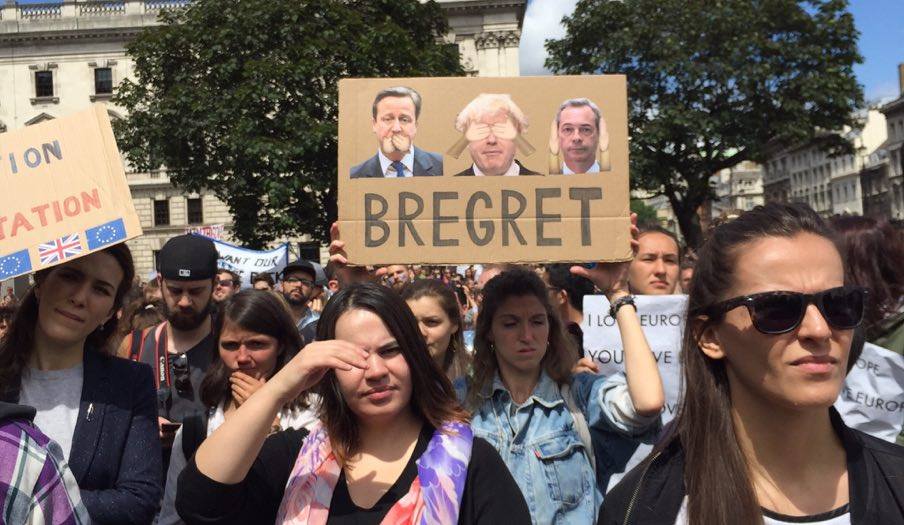How calamity and injustice can bring us together: Brexit’s silver lining

- Part of Bright Green’s new political engagement series
On the morning of the 24th June 2016, there were waves of political change reverberating all over the country. Not only had the UK just left the EU, but the Prime Minister would soon resign, a vote of no confidence would be passed on Jeremy Corbyn, Nigel Farage would resign from UKIP, and political unrest would arise from the Leave campaign’s narrow victory.
Incidentally, political engagement seemed to be higher than ever: 72.21% of voters voted in the referendum, the Green Party leadership election has recorded record voting numbers, and Labour experienced a surge in membership after a second leadership ballot was announced. It seems that, in times of political unrest and big events, political involvement rises – especially if the event is perceived as being a negative one.
I speak from experience when I say that Brexit has triggered huge political involvement in young people – especially those in the 16-18 age range who were opinionated on the subject, yet denied the right to vote. I remember waking up on the day of the result to sound of my friends collectively rueing the outcome – frankly we felt robbed that such a big decision on the future of our country was taken away from us, despite the fact that we were mature enough to make a decision. The 16-17 age range has been proven as politically active (especially in Scotland, where 16 year-olds can vote in local and national elections) but that’s another debate for another time.
Yet from that low, plenty of good has come out of it. I’m now a proud member of the Green Party, as are some other friends (with another joining Labour) and we’ve all registered to vote, chomping at the bit to do so for the first time. My local party experienced an influx of 20 paid members in a matter of weeks, and it seems overall that Britain has become a more politically involved country. But why? Why, in the face of uncertainty and bad events, do we (especially the young) seem to get more involved in politics?
Mainly, it’s because getting involved in politics makes us feel significant and in control. Politics is an excellent vehicle for change, and therefore getting involved in politics makes us feel like we’re making a difference, bolstering confidence. Whether it’s as small as signing an online petition or as time-consuming as canvassing door-to-door, getting engaged with the political climate gives us a degree of control of how the country is run – and ultimately, control of our lives and our environment is what we want.
I cite this as a reason for political involvement because it’s what got me into politics. I’ve always been terrified of climate change, and there were times when I used to drive myself to anxiety just thinking about it – I felt helpless, and I thought that climate change would get worse and worse and I could do nothing about it. Joining a political party remedied this – sure, I may not be an elected MP or have a direct say in the runnings of the country, but I can leaflet, canvass, campaign, and pressure political figures on taking action on climate change, and now I don’t feel quite so helpless.
Another reason for spikes in political involvement after badly perceived events is our tendency to band and work together when facing problems. In times of vulnerability and negativity, we realise that teaming up and working together is the best way to tackle problems, and the fallout of Brexit is a great example of this: young people who weren’t allowed to vote banded together and protested outside of the Parliament, hoping to create change and avoid future voting injustices. The cross-party More United movement was set up, and the Greens proposed a progressive alliance between themselves, Labour, the Lib Dems, and Plaid Cymru.
Not only do these alliances help us fight problems, but they also reassure us that there are plenty of people who feel the same about recent events, and give us a sense of belonging. This “all in the same boat” mentality is what brings people into politics after negative events, and is a big reason why I’m as politically involved as I am today.
From this, political parties can learn that, in the face of adversity and an uncertain future, they should offer a message of hope and unity in order to raise engagement and membership. Making politics seem more constructive than fear-mongering will ultimately attract more people towards it, and creating a positive atmosphere is integral to that.
If you would be interested in contributing to this article series on political engagement please email allsopbradley@gmail.com with an article pitch




Call me wind because I am ablsulteoy blown away.